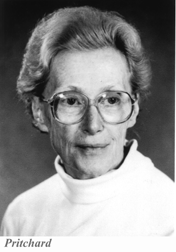The University Record, October 8, 1996
University Wallenberg Lecture features Pritchard
 By Bernie DeGroat
By Bernie DeGroat
News and Information Services
Marion van Binsbergen Pritchard, who helped save the lives of at least 150 people—mostly children—in Nazi-occupied Amsterdam during World War II, will deliver the seventh annual University Wallenberg Lecture at 7:30 p.m. Oct. 16 in the Rackham Building Auditorium.
Pritchard, associate professor and co-director of the Institute for the Study of Violence at the Boston Graduate School of Psychoanalysis, will address “The Active Role of Jews in Rescue and Resistance During the Holocaust” in her free, public talk.
She also will receive the Raoul Wallenberg Medal, established in honor of the University of Michigan alumnus who, as a Swedish diplomat in Budapest in 1944, helped save the lives of thousands of Hungarian Jews by bargaining with Nazi officials, establishing safehouses, distributing false passports, disguising Jews in Nazi uniforms and setting up checkpoints to avert deportations.
In addition, Pritchard will be available to the public at a coffee hour sponsored by the University Center for the Child and Family and the University Wallenberg Endowment at 10 a.m. Oct. 17 in Room 4448, East Hall. That same day, at 8 p.m., she will meet with the public at an event sponsored by Dutch Studies, Department of Germanic Languages and Literatures, in the Rackham Building’s West Conference Room on the 4th floor.
Pritchard, born in The Netherlands in 1920, was enrolled at the School of Social Work in Amsterdam when the Nazis occupied Holland in 1940. While working at a rehabilitation center in 1942, she was asked to take care of a Jewish infant, who stayed several months with Pritchard and her family until a safer place outside Amsterdam could be found.
From then through the end of the war, Pritchard helped hide and care for many Jews seeking refuge from the Nazis. She even passed off as her own three Jewish children for whom she cared and helped “kidnap” another Jewish child from her Nazi captors.
After the war, Pritchard worked at Displaced Persons camps organized by the U.N. Relief and Rehabilitation Administration in the U.S.-occupied zone of Germany. It was there that she met and married her husband, Tony Pritchard, who had been an officer in the U.S. Army and who also worked at the camps.
The Pritchards came to the United States in 1947 and Marion, fluent in Yiddish, was hired by the Jewish Family and Child Service in Boston to help refugees put their lives back together. In the past 50 years, she has practiced social work and psychotherapy, focusing on the well-being of children.
Established in 1985, the Wallenberg Endowment funds the annual lecture and medal presentation, and provides support each year for doctoral students whose scholarly work is related to the goals and values of the lectureship. The endowment is made possible through the contributions of nearly 500 individuals and organizations in the United States, Canada and Europe.
Previous recipients of the Raoul Wallenberg Medal are Nobel-laureate and Holocaust survivor Elie Wiesel; Jan Karski, courier for the Polish underground resistance during World War II and an early witness to the Holocaust; Helen Suzman, a long-time South African legislator and crusader against apartheid; Buddhist leader Tenzin Gyatso, the 14th Dalai Lama of Tibet and Nobel Peace Prize winner; Miep Gies, the woman who helped care for Anne Frank and her family while they hid from the Nazis during World War II; and former Swedish diplomat Per Anger, who helped Wallenberg save the lives of Hungarian Jews during World War II.
For more information on the University Wallenberg Lecture, call Vi Benner, Rackham School of Graduate Studies, 647-4566.

